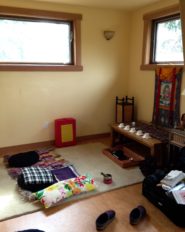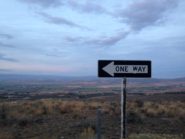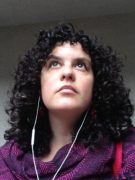Monster Under a Clear Blue Sky: Anger, Meditation, and Writing
One of my five roommates recently told me I am aggressive. We were in the kitchen and he was washing dishes. That night in the kitchen, I could be heard yelling, several times, “I am not f***ing aggressive.” The truth is, I have been in a six-month bad mood. My body is going through changes and I am prone to outbursts of anger and sadness. This is occurring within a deadly political landscape that nurtures hate and violence.
In a supermarket in Mailbu last year, I scolded a man who rudely bumped me with his cart. When he snapped back at me, I yelled loudly at him; I cursed. He proceeded to call me crazy in a taunting tone and I continued cursing him. This outburst left me feeling worn out and guilty that I couldn’t control my anger.
I am a Buddhist practitioner, which means that I deal in mood regulation, compassion, and skillful exertion to prevent harm. But I am human and I am often confused. When I sit here in my bedroom/office, with the curtains blocking the midsummer sun, I write to explain, to understand how aggression works in me and in the world.
* * *
 In Buddhist philosophy, speed is often referred to as a form of aggression. The way we rush through everything without mindfulness is a bit violent and often causes a blindness. We are moving so fast, we render other beings invisible in haste to meet our needs.
In Buddhist philosophy, speed is often referred to as a form of aggression. The way we rush through everything without mindfulness is a bit violent and often causes a blindness. We are moving so fast, we render other beings invisible in haste to meet our needs.
Meditation—the process of sitting with your thoughts and letting them be, or of actively cultivating love—is slow, as is writing. These practices slow us down and they work slowly on us.
Murder works quickly. This past weekend in Charlottesville, Virginia, a woman was murdered. She’d been attending an antifascist counterprotest to the white nationalist Nazis who’d arrived en masse to demand that a sculpture of the Confederate General Robert E. Lee not be removed. A man killed her when he intentionally drove his car into the antifascist counterprotestors. He is a known Nazi sympathizer.
I watched Facebook explode with this information and, since murder works quickly, I watched some friends wish death or bodily harm on these white supremacists. Others posted pictures of the terrorists with requests to share, so that employers would be aware that their employees were white supremacists and/or Nazis. These friends posting on FB will not perpetrate violence, but they are angry, and probably at a loss for how to counter this kind of aggression. I hear a lot of talk about choosing a side.
* * *
One can see anger as messy and harmful—me yelling at the guy in Malibu—or as a form of wisdom that can cut through untruth and see all sides clearly through the cloudy stories that form in our minds during an outburst. Who was I in the moment that man bumped me; who was he? How does my roommate experience my actions? My anger tells me something about them too. Where is the place for this clear-seeing anger right now? How can it assist us?
I don’t know.
I think that some people might view the white supremacist Richard Spencer being punched in the face in January as a moment of clarity. Being anti-violence in a world where violence exists in so many forms is complicated. (Impossible?)
* * *
 Right now in the United States there is much discussion about talking to the “other side.” In Buddhism, we think about it often; finding common ground in suffering. In being alive. We know we need to heal rifts. But I find it difficult to face the disappointment I feel in fellow Americans. I don’t want to talk to those people and, from the look of things, they don’t want to talk to me. I don’t want to try to convince them they are wrong. (But I also don’t want to kill them.)
Right now in the United States there is much discussion about talking to the “other side.” In Buddhism, we think about it often; finding common ground in suffering. In being alive. We know we need to heal rifts. But I find it difficult to face the disappointment I feel in fellow Americans. I don’t want to talk to those people and, from the look of things, they don’t want to talk to me. I don’t want to try to convince them they are wrong. (But I also don’t want to kill them.)
What is crystal clear to me (and was before these events) is that racism is alive and well. That male aggression is killing us. That hate propagates quickly and love sparks slowly.
* * *
As a writer, I have the ethical intention to not replicate society’s bias and harm. When I write, my aggression becomes complex on the page and hopefully causes less harm. Because writing is not violent, not fast, it can siphon out hatred. But does it do any good?
I don’t know.
In meditation, my aggression boils and evaporates, turns to sadness, to air. It can feel like magic. But only if I meditate regularly. I know this practice helps me to avoid screaming matches. When practiced with more dedication than I am currently practicing, it will cultivate the bravery needed to answer some of these questions. I do not wish for meditation to cure my anger about injustice. Buddhist practice works to end suffering, which means that a practitioner must be concerned about injustice.
* * *
What should I be writing about? Should I be writing at all? I cannot answer these questions today. My anger does not feel wise or useful. My writing is filled with self-indulgent questioning.
* * *
In Buddhism, the word “extinguish” is used to describe how our meditation practice helps us to cool the heat of the self—the self that believes things strongly. The hot self who lusts and needs and hates. As a writer and a politically engaged human in the Western world, one of my daily tasks is how to cool these flames while continuing to act. This requires reservoirs of compassion filtered through turbines of wisdom to act skillfully: as true in writing as it is in meditation.
Maybe I dilute the clarity of anger with questions. I am reminded of this by Timothy Snyder’s On Tyranny, Twenty Lessons from The Twentieth Century. Lesson #11 is “Investigate.” Inquiry is part of Buddhist practice too. Meditation practice and the ethical code of Buddhism asks us to look at causes and conditions. What are the causes of this racist violence and the conditions under which it has festered?
Lesson #4 in On Tyranny is “Take responsibility for the face of the world,” in which Snyder instructs readers to notice the swastikas and to remove them. “Do not look away and do not get used to them.”
In meditation, we practice clear seeing, so we might take responsibility for ourselves and the world.
* * *
This is how I use a Buddhist lens to look at my country and myself. Sometimes I see a monster, but she is under a clear blue sky.

* * *
Today I write to counter my own aggression. So that my aggression evaporates, allowing me to see how to proceed skillfully when I change the face of the world.
May we slow down, see, stop killing.
 Meredith Arena is from New York City and resides in Seattle where she works as a teaching artist in the public schools and facilitates meditation for adults. She is a student in the MFA program at Antioch University Los Angeles. She is a Creative Nonfiction Editor on Lunch Ticket. Her work has appeared in Entropy, Lunch Ticket and SHIFT Queer Literary Arts Journal.
Meredith Arena is from New York City and resides in Seattle where she works as a teaching artist in the public schools and facilitates meditation for adults. She is a student in the MFA program at Antioch University Los Angeles. She is a Creative Nonfiction Editor on Lunch Ticket. Her work has appeared in Entropy, Lunch Ticket and SHIFT Queer Literary Arts Journal.





